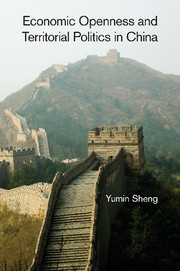Book contents
- Frontmatter
- Contents
- List of Tables
- List of Figures
- Acknowledgments
- List of Abbreviations
- 1 The Territorial Politics of Economic Openness in China
- 2 Globalization, Institutions, and Domestic Territorial Politics: A Theoretical Framework
- 3 Economic Openness and Its Regional Dimension
- 4 Central Political Control via the CCP
- 5 Global Market Integration and Central Political Control
- 6 Consequences for Fiscal Extraction and Economic Growth
- 7 Globalization, Single-Party Rule, and China's Transitions
- References
- Index
4 - Central Political Control via the CCP
Published online by Cambridge University Press: 10 November 2010
- Frontmatter
- Contents
- List of Tables
- List of Figures
- Acknowledgments
- List of Abbreviations
- 1 The Territorial Politics of Economic Openness in China
- 2 Globalization, Institutions, and Domestic Territorial Politics: A Theoretical Framework
- 3 Economic Openness and Its Regional Dimension
- 4 Central Political Control via the CCP
- 5 Global Market Integration and Central Political Control
- 6 Consequences for Fiscal Extraction and Economic Growth
- 7 Globalization, Single-Party Rule, and China's Transitions
- References
- Index
Summary
INTRODUCTION
I have argued that the political center has incentives to redress the growing regional economic gap through fiscal transfers in order to maintain its own national rule. However, fiscal resources for interregional redistribution are more likely to come from the richer but more restive subnational regions thriving in the global markets. Following Riker (1964), I suggest that the ability of the center to extract revenues from the winner regions in the era of economic openness should be greater in political systems that are governed by centralized political parties. Other things being equal, central governments in countries ruled by one single political party that wields personnel powers over subnational copartisans (in the most centralized political system) should be more effective in performing such regional balancing tasks via exercise of territorially targeted political control and revenue extraction.
In response to rising regional disparity and discontent as the country opened its doors to the world markets, the Chinese central government seemed able to pursue interprovincial fiscal redistribution slanted toward the loser provinces in the inland all along. Such redistributive capacity of the Chinese central government has to be understood in the context of the political prepotency imparted to the national political leadership by a most centralized governing political party. In this chapter, I first provide more details on the political institutions within the sole-ruling CCP that afford the center the requisite political supremacy and the related ability to engage in regionally selective exercise of political control over the provincial governments.
- Type
- Chapter
- Information
- Economic Openness and Territorial Politics in China , pp. 100 - 142Publisher: Cambridge University PressPrint publication year: 2010



